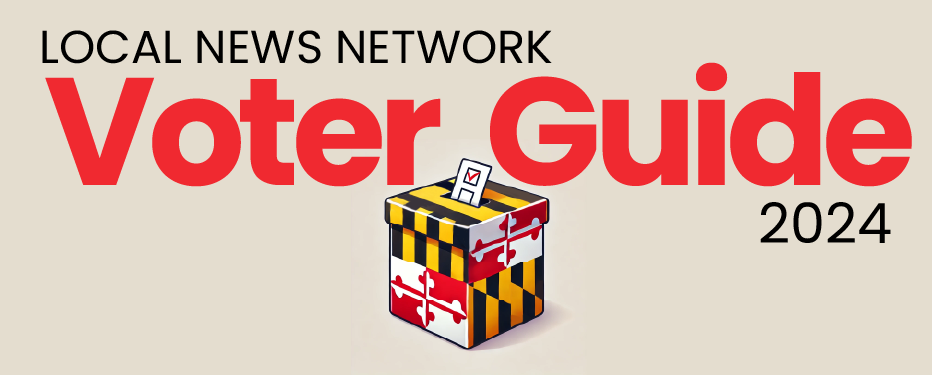Max Green
Running for school board in Allegany County
How old will you be on Election Day (Nov. 5)?
33
Are you currently employed? If so, where, and what is your job title?
Senior technology representative, U.S. Senate sergeant at arms.
What is the highest level of education that you completed, and where did you get that degree?
Master's degree in public management, Johns Hopkins University.
Why are you running for the school board?
I am running for the Allegany County Board of Education because I believe in the power of public education to transform lives, and I want to ensure that every student in our county has access to the best possible education. As a parent and the husband of a public-school teacher, I have a personal stake in the future of our schools. I’ve seen firsthand the challenges facing our educators, from classroom management issues to a lack of support for students who need it most.
I’m committed to addressing these challenges by advocating for clear, consistent discipline policies, improving parent and community engagement, and fostering transparency and accountability in school board decisions. My professional experience in public management and my role as a community leader have given me the skills to approach these issues with a solutions-focused mindset.
I’m running because I believe we need new voices and fresh ideas on the Board of Education—voices that will prioritize students, listen to teachers, and work tirelessly to improve our schools.
I'm also running because I know how frustrated parents and teachers are with the current Board of Education. Our current elected board is not prepared for the realities of Blueprint implementation. I'm running because I want to ensure that we have the right person for the job who can make sound, transparent decisions about this implementation based on feedback from all stakeholders.
Finally, my experience growing up in rural Allegany County is similar to many others. I was primarily raised by my grandmother, who worked full time until her death to provide for my siblings and me. I had to get a job at the age of 14, which I had to balance with school and extracurricular activities, to help make ends meet. We did not have much, and I felt like I would never make it out of the cycle of generational poverty. My saving grace was teachers and community members who stepped up to help me navigate the transition out of school—helping me to apply for student aid and to college as a first-generation college student. I owe so much to them, and one of the most effective ways to pay it forward is by looking out for the next generation of our community.
What makes you a good candidate for the board?
I am running for the Allegany County Board of Education as a lifelong community organizer, a dedicated public servant, and an advocate for students, teachers and families. I bring over a decade in public sector project management and leadership experience, an understanding of the complex issues facing students and families as a former community mental health services provider and a deep passion for making the world a better place. My master’s degree in public management and data analytics from Johns Hopkins University has prepared me to approach educational challenges with a focus on data-driven solutions and accountability.
As the husband of a public-school teacher and the father of two young children, I understand the importance of ensuring that every child has access to a high-quality education in a safe, supportive environment. I have firsthand experience advocating for our community, having founded the West Side Neighborhood Association and serving on the Local Advisory Council for Career and Technical Education.
My platform centers on three core priorities: improving classroom management and discipline policies, increasing parent and community engagement, and ensuring transparency and accountability in decision-making. I will work to strengthen our schools by fostering meaningful discourse, creating clear policies that support teachers and students, and ensuring that the board remains accessible and responsive to the needs of the community.
With my diverse experience and strong commitment to public service, I am ready to bring a fresh perspective and a focus on solutions to the Board of Education. Together, we can build stronger schools and a brighter future for all students.
What is the most important issue facing your school board and what would you do about it if elected?
While I am tempted to argue that the Blueprint for Maryland's Future is the most important long-term issue, there is a crisis in discipline and classroom management that is making it difficult to achieve the primary mission of our school system: ensuring all students' right to a high-quality education in a safe and productive learning environment. It also undermines efforts to recruit and retain high-quality educators.
Please name a public leader you admire and explain why.
I have always admired Franklin Delano Roosevelt for leading our nation through one of its most challenging periods since the Civil War. Domestically, he tackled the Great Depression with the New Deal — arguably one of the most influential policy sets in American history. The New Deal provided a social safety net, labor protections and critical banking regulations, while also enabling rural electrification and building infrastructure that shaped modern America. Beyond his domestic achievements, Roosevelt played a pivotal role in guiding the U.S. through the global crisis of World War II. He ended isolationism, supported the Allies, and mobilized the U.S. war effort after Pearl Harbor. His leadership, along with his advisors and the sacrifices of American servicemembers, made victory possible. Roosevelt’s vision and resilience continue to inspire me as a model of leadership in the face of unprecedented challenges and remind me that we've weathered greater existential threats to our nation, democracy, and justice.
The Blueprint for Maryland’s Future, passed by the General Assembly in 2021, is a 10-year plan that includes increased education funding to support early childhood education, increased teacher starting pay, college/career-readiness standards for high school graduates, and expanded services to multilingual and impoverished families, among other goals. Please tell us your views on the Blueprint and how it will affect your school district.
The Blueprint for Maryland’s Future is a transformative plan for public education, addressing critical needs such as early childhood education, increased teacher pay and expanded support for underserved families. For Allegany County, this initiative is a much-needed boost, as it provides the resources to address long-standing challenges, particularly in schools serving low-income, rural families. However, for the Blueprint to succeed, the focus must be on how these funds are used at the local level.
Increased teacher pay and support services are crucial for attracting and retaining quality educators, but we must ensure that this funding reaches classrooms and benefits teachers directly. Professional development, classroom management tools, and support staff should be prioritized to create a more stable learning environment. Additionally, the Blueprint's focus on career and technical education offers significant potential for Allegany County, especially in preparing students for jobs in skilled trades.
Effective implementation of the Blueprint requires strong community engagement. Parents, teachers, and local leaders must be involved in decisions about how resources are allocated and used. If elected, I will advocate for transparency and accountability to ensure that these historic investments lead to real, measurable improvements for students and educators. My goal is to ensure that Allegany County not only benefits from the increased funding but also builds sustainable, long-term improvements to the quality of education and opportunities for all students. I also believe that this requires transparent and thoughtful consideration of the implementation plan, ensuring we do not misrepresent the areas of need in our community and school system.
This is a pivotal moment for Maryland’s schools, and we must get it right.
Some school districts nationwide are placing new limits on the use of cellphones in middle and high schools. What do you think should be the policy on student use of cellphones in your district, and why do you support that policy?
Cellphone policies remain one of the most difficult areas for school systems to address. While there’s some agreement among students, parents, teachers, and administrators, key issues—like maintaining communication during emergencies—continue to create divides. Our current policy, which leaves phone use up to teacher discretion, is inconsistent and places too much burden on teachers without adequate support from school leadership or the Board of Education. I believe phones should be allowed during lunch, study hall and advisory periods for older students, but not in classrooms, bathrooms or locker rooms. However, enforcement is nearly impossible under current practices. We need a clear, districtwide policy, backed by data and modeled after successful approaches in other areas. This policy should prioritize minimizing disruptions, bullying and harassment while balancing the need for safety and acknowledging the realities of our highly-connected world. Continuous review and adjustment will be necessary as we gather feedback.
Are you satisfied with your school district's efforts to ensure the safety of its students? What, if anything, should be done to improve school safety in your district?
No, I am not satisfied with our school district’s efforts to ensure student safety. I believe the system is failing our students, and I fear more serious acts of violence will occur if changes aren’t made. We currently lack metal detectors, and teachers and administrators are often discouraged — or outright unable — to refer students for disciplinary actions. Discipline and safety concerns are inconsistently handled, creating a dangerous environment. I've spoken with many teachers and parents who have reported incidents of weapons, like knives, being brought to school, yet the students responsible often face no real consequences or referrals. We must reevaluate discipline policies, encourage teachers to report all incidents of violence or threats, and ensure public input to improve safety measures. Additionally, online bullying continues unchecked, and schools need better ways to address these issues. Our focus must be on creating consistent, transparent policies to protect every student.
Do you think there are circumstances when books should be removed from school libraries? If so, what kind of books should be removed, and who should make those decisions?
Books should not be banned or removed from school libraries. Instead, if there are concerns about a lack of diverse perspectives, I encourage adding more books, not restricting access. Exposure to a wide range of ideas is crucial for developing critical thinking, emotional intelligence,\ and the skills necessary for a healthy democracy. Limiting access to books or discouraging literacy harms students. Research consistently shows that access to books directly correlates with higher reading scores, and for many children—especially those from low-income families—school libraries are their primary source of reading materials. According to the National Center for Education Statistics, 61% of low-income families have no books in the home, making school libraries essential. Our children need more books, more ideas and more opportunities to read—not fewer.
Some school districts enact policies allowing transgender and gender nonconforming students to use their preferred pronouns while at the same time not informing those students' parents about that decision. What is your opinion of such policies?
No law restricts parents from discussing gender identity or preferred pronouns with their children. It's unreasonable to expect teachers to monitor such private conversations, and it is not their role to inform parents about a student’s pronoun preferences unless legally required. Every student deserves to feel safe and supported in school, regardless of their identity. Using preferred pronouns fosters an inclusive environment and allows students to feel accepted. Importantly, this practice causes no harm to others—it simply reflects respect for the individual. Schools should prioritize creating an environment where all students feel valued, ensuring their personal choices are respected as long as they do not negatively impact others. In the absence of court rulings or specific legislation, it’s essential to protect the privacy and dignity of all students while maintaining the focus on their well-being and education.


